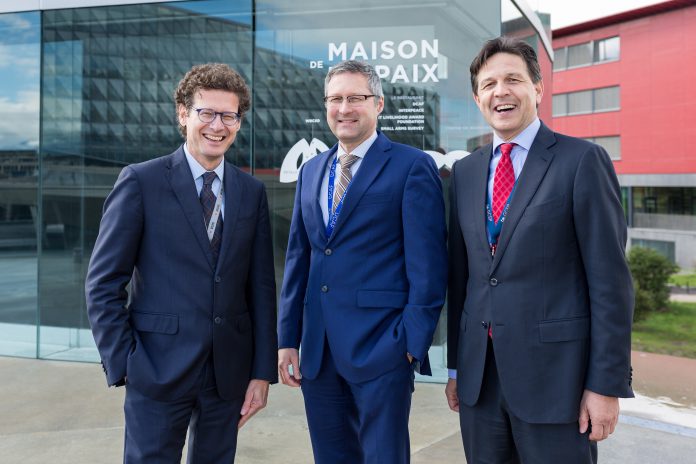Geneva Centre for Security Policy (GCSP)
Geneva International Centre for Humanitarian Deming (GICHD)
Geneva Centre for the Democratic Control of Armed Forces (DCAF)
Spearheading Switzerland's commitment to peace and security, the three centers operating from the Maison de la Paix export the values of international Geneva to the world.
Peace is an integral part of brand Switzerland. Good offices, mediation and negotiation facilitation are its best-known facets. It was in the wake of this policy that the first of Geneva's three centers, the Center for Security Policy (GCSP), was created.
"The 1985 Reagan-Gorbachev summit in Geneva marked the beginning of an era of détente between the great powers, in which Switzerland saw a magnificent opportunity for its foreign and security policy," says Christian Dussey, Director of the GCSP. "But at the time, the Confederation was faced with a lack of specific expertise in the diplomatic corps and the military, particularly in the fields of disarmament and arms control. For this reason, crash courses were organized in Geneva".
Three years later, these courses were opened up to representatives from other countries. Today, the GCSP offers over 80 courses, with around 1,100 participants a year. But that's not all. "In Geneva, there are two colliders: CERN's particle collider and ours," adds Dussey with a smile. Indeed, at the GCSP, the most diverse international players - government representatives, the military, NGO activists, journalists, entrepreneurs - meet, discuss and work together. "Here, NGOs talk to arms producers, representatives of enemy countries sit next to each other", remarks the center's director, who emphasizes: "In this complex, uncertain world, creativity, courage and innovative, agile leadership are required".
Capitalizing on diversity enables us to acquire the cross-sector know-how needed today, and to nurture networking. The GCSP's 6,000 alumni include a number of high-ranking personalities from all over the world: ministers of foreign affairs and defense, high-ranking officers of major powers, opinion makers, who also prove to be privileged contacts for Swiss diplomacy after their stay in Geneva.
"We embody the values of Swiss foreign policy, we contribute to its excellent reputation, but we are not a direct instrument of it," points out Thomas Gürber, who heads the Centre for the Democratic Control of Armed Forces (DCAF). "It is imperative that we are perceived as impartial if we are to be effective", stresses the ambassador, who heads a staff of 175 active in over 70 countries, with the most diverse profiles: fragile or conflict-affected countries, or those engaged in a peace process, in democratic transition or middle-income countries that are improving their security and justice services and are committed to prevention.
The aim is to consolidate governance in the field of security. To achieve this, the DCAF works with a wide range of actors, such as the armed forces, the police, prison administrations, the judiciary, ministries of defense, foreign affairs, parliaments or NGOs called upon to exercise democratic control. It also contributes to meeting contemporary challenges, such as those linked to cyber-security and private security companies.
Today, DCAF is a truly global organization, with 62 countries (plus the Canton of Geneva) on its Board of Trustees. It works in collaboration with the UN, the European Union, the African Union, the OSCE, the World Bank and other inter-state organizations to improve the chances of project success.
"With us, the team is really motivated and identifies with its mission because our results are tangible," says the director, who has been at the helm of DCAF for a year, after a career at the FDFA devoted mainly to multilateral relations. "Almost anything is possible, when you succeed in mobilizing intellectual capacity and persuasion", concludes Gürber, who emphasizes the creative force of multilateralism.
Creative and innovative are the 65 employees of the Center for Humanitarian Demining (GICHD), founded in 1998 and headed by Stefano Toscano for the past 3 years. Their task: to ensure effective and efficient demining thanks to cutting-edge know-how which, for example, enables contaminated areas to be delimited much more precisely. This makes demining faster and far less costly. "It's not just about clearing land infested with explosives, it's about building a sustainable future," says Toscano, underlining the scale of the GICHD's impact on the countries it helps. Mines are a danger to populations, but also a major obstacle to reconstruction and economic and social development. The center goes beyond physical mine clearance. It ensures that international standards are applied, and contributes to the drafting of laws and strategies, as well as to information management through innovative tools designed with its academic and private sector partners.
"The software used to manage data on the location of mines, for example, was originally developed in collaboration with the Swiss Federal Institute of Technology in Zurich," points out the ambassador, who also emphasizes the need for GICHD action to adapt to a context that has evolved considerably. Conflicts are changing. They are now more complex and prolonged in nature, very often in urban environments, with unprecedented means at their disposal. "The success of the Ottawa Convention, which prohibits the use of anti-personnel mines, is encouraging certain armed groups to use improvised devices in Syria, Afghanistan and Iraq," explains the GICHD director. "We are working on standards and tools to meet these new challenges, also collaborating with companies, some of which are also becoming financial partners." The GICHD is fighting to maintain the importance of mine action on the political agendas of states, and is committed to protecting the humanitarian action of deminers threatened by the new nature of conflicts. Sixty countries are still mine-infested and need the help of the GICHD, a competent, credible and independent organization like Switzerland.


